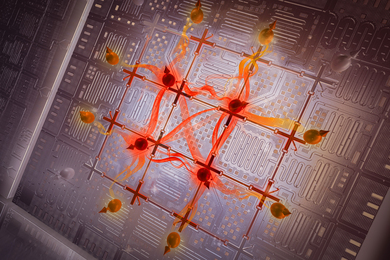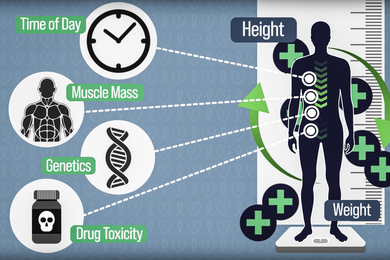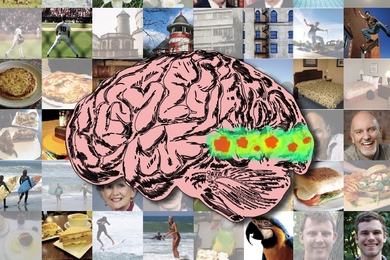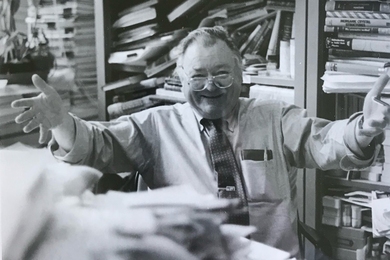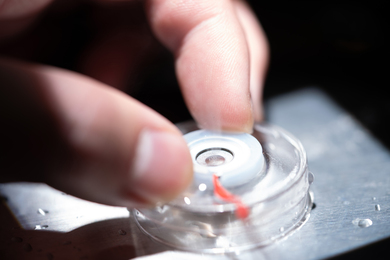Three faculty members in the Department of Biology have received named professorships.
Professor Richard O. Hynes , director of the Center for Cancer Research (CCR) and a Howard Hughes Medical Institute Investigator, has been named a Daniel K. Ludwig Professor for Cancer Research.
This appointment is supported by an endowment from the Virginia and D.K. Ludwig Fund for Cancer Research. The total bequest is intended to support three chairs, graduate fellowships and a UROP fund, all for cancer research. In 1997, Dr. Robert A. Weinberg, a founding member of the Whitehead Institute for Biomedical Research and of the CCR, was named as the inaugural Ludwig Professor; Dr. Tyler E. Jacks of the CCR was also named a Ludwig Scholar for Cancer Research.
In making the announcement, Dean of Science Robert J. Birgeneau said, "Mr. Ludwig's generosity is having an enormous impact on MIT's efforts in cancer research. I am very pleased to recognize the leadership of Richard Hynes in this area."
Professor Hynes received the BA and MA in biochemistry from the University of Cambridge and the PhD in biology from MIT in 1971. After doing postdoctoral work at the Imperial Cancer Research Fund Laboratories in London, where he initiated his early work on cell adhesion, he returned to MIT as a founding member of the Center for Cancer Research.
Professor Hynes served as associate head and head of the biology department from 1985-91. He has received a Gairdner Foundation International Award (1997) and a Guggenheim Fellowship and is a Fellow of the Royal Society of London, the American Association for the Advancement of Science, and the American Academy of Arts and Sciences. He was also elected a member of the National Academy of Sciences' Institute of Medicine in 1995; a member of the National Academy of Sciences in 1996; and president-elect of the American Society for Cell Biology in 1998.
Professor Hynes's lab focuses on the molecular basis of cellular adhesion using cellular and molecular biology, genetics and other approaches, both in vitro and in intact animals (mice and flies). His research concentrates on fibronectins, a family of extracellular adhesive proteins generated by alternative splicing of the transcript of a single complex gene, and on their cell surface receptors, the integrins, which are encoded by a multigene family. Integrins are the major adhesion receptors connecting the extracellular matrix to the intracellular cytoskeleton and are also involved in transmembrane signaling.
"We are particularly interested in the roles played by fibronectins and integrins during embryonic development, hemostasis and thrombosis, wound healing, angiogenesis and cancer. We are also studying another family of adhesion receptors, the selectins, which function in cell-cell adhesion during leukocyte recruitment and inflammation. All of these adhesion proteins play important roles in pathogenesis," Professor Hynes said.
Mr. Ludwig, a real estate magnate and the founder of National Bulk Carriers, left the major portion of his estate to cancer research, making bequests to Harvard, Johns Hopkins University, Stanford University, the University of Chicago and the Memorial Sloan-Kettering Cancer Center as well as MIT. All the recipient universities except MIT have medical schools affiliated with teaching hospitals (Sloan-Kettering is itself a teaching hospital).
Professors H. Robert Horvitz and Susumu Tonegawa have received Whitehead Professorships. The chairs were created from a donation by the Edwin C. Whitehead Charitable Foundation to strengthen biology at MIT.
Professor H. Robert Horvitz, who is known internationally as an expert on the genetic analysis of animal development, is a professor in the Department of Biology at MIT and an investigator for the Howard Hughes Medical Institute. He is noted for his work on how genes control three aspects of animal development: cell lineage, or how a single fertilized egg undergoes repeated divisions to create the many distinct cell types of an adult animal; cell signaling, or how cells communicate with each other; and cell death.
He received the PhD in biology in 1974 from Harvard University, and was a postdoctoral researcher at the Medical Research Council Laboratory of Molecular Biology in Cambridge, England. He joined the faculty of MIT in 1978, became a professor of biology in 1986 and an Investigator for the Howard Hughes Medical Institute in 1988. Since 1989, he has held appointments at the Massachusetts General Hospital in neurology and medicine.
Professor Tonegawa received the PhD from the University of California at San Diego; he did postdoctoral work there and at the Salk Institute. He then continued his research as a member of the Basel Institute for Immunology in Switzerland.
Since 1981, Professor Tone-gawa has been a professor at MIT's Center for Cancer Research. In 1988, he became an investigator for the Howard Hughes Medical Institute. In April 1994, he became the director of MIT's new Center for Learning and Memory and a month later, he received the first Amgen Professorship.
Professor Tonegawa has received numerous honors including the Nobel Prize in Physiology or Medicine in 1987 for his seminal discovery of the genetic origin of antibody diversity. His current research focuses on applying novel molecular genetic techniques in mice to probe the molecular basis of learning and memory.
A version of this article appeared in the September 15, 1999 issue of MIT Tech Talk (Volume 44, Number 5).
